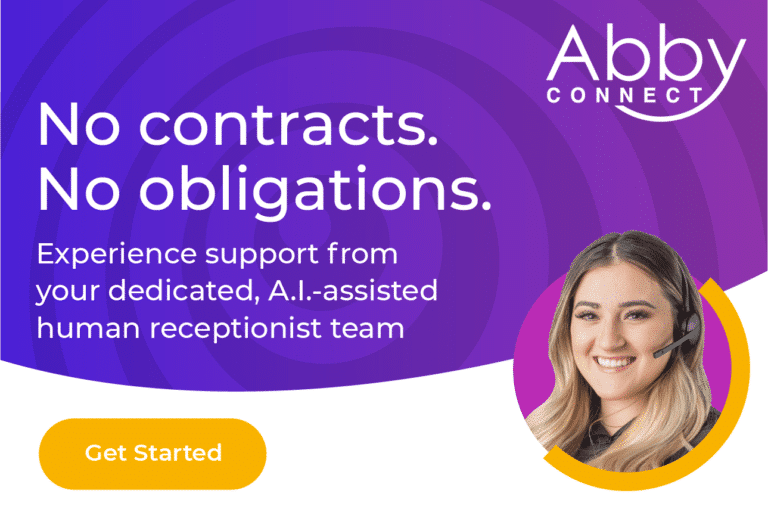You might have noticed that often when you call an office, the receptionist who answers will reconfirm your name and address using a phonetic alphabet. For example, if you say your name is Alan, the receptionist may confirm the spelling our your name by saying, “A as in Alpha, L as in Lima, A as in Alpha, and N as in November?” Sounds familiar, right? This is a perfect example of a person using a phonetic alphabet. In this article, we’ll explain how the use of a phonetic alphabet came to be and why it’s just simply a good practice to use while on the phone and call handling.
What is the Phonetic Alphabet?
The Phonetic Alphabet, also known as the International Phonetic Alphabet (IPA), is a system of symbols and notation used to represent the sounds of human speech. It provides a standardized and consistent way to transcribe the sounds found in different languages and dialects. The Phonetic Alphabet includes symbols for consonant and vowel sounds, as well as diacritic marks and modifiers to indicate various aspects of pronunciation, such as stress, tone, and articulatory features. It is widely used by linguists, language teachers, speech pathologists, and researchers to accurately describe and analyze the sounds of spoken language.
How It Can Be Used
Phonetic alphabets are most commonly used during telephone calls when it is easy to mishear names and words spoken by callers. There are multiple reasons why we use phonetic alphabets to confirm email addresses and proper nouns, such as names of people and places. The most important reason here, though, is by using a phonetic alphabet, we aid in avoiding miscommunication and human errors.
A Brief History of the Phonetic Alphabet
The phonetic alphabet has an interesting history and is a widely employed strategy to avoid misunderstanding during calls. British Army signalers were the first to use the phonetic alphabet to avoid confusion in military contexts. The War Office issued the “Signalling Instruction” in 1898, later revised and updated in 1904. Soon, the Royal Air Force developed the Telephone Spelling Alphabet during World War I. Later, this was codified formally and used by the Allied nations.
After World War II, many improvements were made to existing spelling alphabets, and the NATO Phonetic Alphabet was born. There are many versions of this alphabet, and it depends on the country where it is used. The Western Union developed its own phonetic alphabet for the public to use during dictating telegrams over the phone. Today, several phonetic alphabets are commonly used, including the NATO phonetic alphabet and the Western Union Phonetic Alphabet.
Though the commonly used name for the set of words used to denote letters of an alphabet during oral communication is “phonetic alphabet,”, it is also correct to call it the following:
- Spelling alphabet
- Telephone alphabet
- Word spelling alphabet
- Voice procedure alphabet
- Radio alphabet
Wow! That’s some history, alright. And, this system keeps on expanding and evolving as the years and technologies advance. There are so many reasons to use a phonetic alphabet nowadays. Let’s take a look at a few of those examples.
Why We Use the Phonetic Alphabet on the Phone
Every institution has its reasoning as to why they use a phonetic alphabet over the phone. And, believe us when we say there is plenty of good reason out there. But, to narrow things down here, we’d like to share why we find it so important to use the phonetic alphabet over the phone.
1. Names of people and places can be unfamiliar
We live in a multicultural society, and it’s not always possible for us to recognize the spellings of all the names we come across every day. Names of places can vary significantly, and the way they are spelled may differ too. A phonetic alphabet removes this doubt while on a call, and second-guessing is no longer a concern for those individuals conversing over the phone.
2. Some words are difficult to spell
Many words are hard to spell, and receptionists may often find it difficult to write them all down. Especially, as is often the case, when a receptionist is juggling several calls at once. If a caller uses technical jargon and unfamiliar words, our live receptionist teams confirm the spelling of those words using our phonetic alphabet.
3. People speak different languages and dialects
In the US, you can find people representing all the world’s nations. Therefore, it is common to hear people speaking different dialects of English or Spanish. Some may even speak another foreign language as their first language. To understand these folks better and to ensure messages are transcribed properly, it is important to reconfirm words using the phonetic alphabet.
4. Letters of an alphabet can be misheard
Though the English alphabet only has 26 letters, several of those letters sound alike. People often confuse F or C with S, J with G, and M with N. You’ve probably done this yourself a few times. Many other letter and sound pairings can easily confuse or mislead a listener. A phonetic alphabet removes that confusion so accurate information can be entered.
5. Some words are too technical or foreign
Many people use foreign-language words such as “schadenfreude” (German) and “Rendez-Vous” (French) while speaking to live receptionists in English. The quick cross-over in language will often throw off a listener that may not be familiar with or even aware of certain foreign language words. Callers may also use scientific terms, technical terms, and the names of medications, which usually sound like words most of us struggle to pronounce. These need to be reconfirmed via the spelling alphabet to root out human error.
6. Many words sound alike, giving rise to confusion
Homonyms are words that are spelled and pronounced the same way. These may cause some confusion during telephone calls. Especially when the person taking down the caller’s information has to do so quickly.
Homophones are words that are pronounced alike but are spelled differently. For example: new and new, raise and rays, weather, weather, etc.
Oronyms are homophones of multiple words, and live receptionists frequently encounter them during calls. For example, vodka and Ford car, depend and deep end, euthanasia, Youth in Asia, etc. Sometimes, people often mispronounce words resulting in pseudo-homonyms and pseudo-oronyms. All these should be reconfirmed via the phonetic alphabet.
7. Pronunciations are often different
People often pronounce words differently or place stress on syllables in quirky ways. Often, callers have unique accents based on their demographics, which can confuse the minds of listeners. For example, your relatives from New England are visiting you on the west coast in California. After telling your Cali friends that your aunt is visiting, you discover that has somehow turned into an “ant.” Or at least you’d think she was magically transformed into an insect if you weren’t already familiar with the different dialects used from coast to coast in the United States. Even though your west coast pals sound like they’re calling your mother’s sister a bug, they’re just dropping the “u” when pronouncing Auntie Emma’s (aka Antie Em’s) name upon introductions. In situations this one, it’s always advised to reconfirm using the phonetic alphabet over the phone.
8. Important details need to be reconfirmed
When important details such as the email address or a telephone number are being recorded, it is recommended to repeat and reconfirm using the phonetic alphabet. This is also true in the case of the first and last names and addresses of callers. Though the receptionist might have heard these words correctly, they may reconfirm to be on the safer side as such details are often entered into records.
How to Put the Phonetic Alphabet Into Action
Now, you might be wondering how to use the phonetic symbol when you’re on a call. If you are the caller and the person at the other end of the call asks you to spell out your name, here is how you need to say it, supposing your name is Allen.
- A as in Alpha, L as in Lima, L as in Lima, E as in Echo, N as in November
- You can substitute “as in” with “like” and say, “A like Alpha,” and so on
- You may also just say the code words. In this case, all that you need to say is “Alpha, Lima, Lima, Echo, November”
You can use the same method to spell your address and email as well.
Telephone calls can give rise to a lot of misunderstandings and miscommunication. This is mostly because of differences in pronunciations, language usage, inaudibility, and poor connections. In all these circumstances, it is important to use the phonetic alphabet most commonly used in a geographical region. In addition, the phonetic alphabet must be used to confirm the name, address, and email, even if it has been said with clarity. This is to avoid grave errors which may cause issues in the future.
Why is the Phonetic Aphabet Important in Call Handling?
The phonetic language holds immense importance in call handling due to its ability to ensure clear and accurate communication between call handlers and callers. In the fast-paced environment of call centers, where information needs to be gathered, recorded, and relayed quickly, the phonetic alphabet becomes a valuable tool.
By using standardized words to represent letters, call handlers can minimize the chances of mishearing or misunderstanding critical details such as names, addresses, and account numbers. This helps to prevent errors, confusion, and delays in providing assistance to callers. Additionally, the phonetic alphabet allows call handlers to overcome challenges posed by distorted audio or language barriers when dealing with diverse callers. It promotes professionalism, efficiency, and accuracy in call handling, contributing to a positive customer experience and maintaining the reputation of the organization.
Clarity and Accurrcy With Abby Connect
Abby Connect’s team of virtual receptionists utilize the phonetic language to enhance communication clarity, maintain professionalism, cater to international clients, overcome audio distortions, and provide accurate documentation. These practices contribute to a positive customer experience and help businesses receive accurate and reliable information from their virtual receptionists.
Sources:
Wikipedia Contributors. (2023, May 20). Allied military phonetic spelling alphabets. Wikipedia; Wikimedia Foundation. https://en.wikipedia.org/wiki/Allied_military_phonetic_spelling_alphabets
Wikipedia Contributors. (2023, June 20). Spelling alphabet. Wikipedia; Wikimedia Foundation. https://en.wikipedia.org/wiki/Spelling_alphabet




